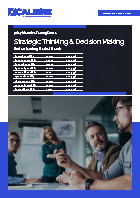| Date | Venue | Fee | |
|---|---|---|---|
| 18 May - 22 May 2026 | London - UK | $ 5,950 | Register Now |
| 22 Jun - 26 Jun 2026 | Dubai – UAE | $ 5,950 | Register Now |
| 06 Jul - 10 Jul 2026 | London - UK | $ 5,950 | Register Now |
| 07 Sep - 11 Sep 2026 | New York - USA | $ 6,950 | Register Now |
| 14 Sep - 18 Sep 2026 | Vienna - Austria | $ 5,950 | Register Now |
| 05 Oct - 09 Oct 2026 | Barcelona - Spain | $ 5,950 | Register Now |
| 02 Nov - 06 Nov 2026 | Dubai – UAE | $ 5,950 | Register Now |
| 30 Nov - 04 Dec 2026 | London - UK | $ 5,950 | Register Now |
| 21 Dec - 25 Dec 2026 | Paris - France | $ 5,950 | Register Now |
| 11 Jan - 15 Jan 2027 | London - UK | $ 6,950 | Register Now |
About the Course
In an era marked by rapid technological advancements, shifting market dynamics, and heightened competition, the ability to think strategically and make informed decisions is more critical than ever. This 5-day interactive Strategic Thinking & Decision Making training course is designed to equip delegates with the essential skills and insights needed to adapt to the demands of today's rapidly changing business environment. It is tailored to give delegates the tools and frameworks necessary to understand and analyse various strategic environments, enabling them to develop and implement robust strategies that drive organisational success and sustainability.
Delegates will be immersed in a structured learning process that balances theoretical knowledge with practical application. Its approach emphasizes the integration of strategic analysis tools and decision-making frameworks, ensuring that they can confidently assess situations and develop actionable plans. Delegates will engage with various contemporary methodologies that facilitate strategic planning and execution, empowering them to address complex challenges with a clear, analytical mindset.
By the end of this training program, delegates will have developed a comprehensive understanding of how to align strategic objectives, with organisational goals, effectively allocate resources, and implement change management strategies. It is about acquiring knowledge and transforming that knowledge into actionable insights that can be applied in real-world scenarios.
Core Objectives
By the end of the training course, delegates will be able to:
- Develop the ability to utilise strategic analysis tools and techniques to assess various business environments, competitive forces, and market dynamics
- Equip with a range of decision-making frameworks and models
- Improve skills in strategic planning, including setting clear objectives, developing strategic roadmaps, and aligning vision and mission statements with actionable plans
- Promote a mindset of strategic agility and innovation, enabling them to adapt to changing business environments
- Enhance how to allocate and manage resources effectively
- Learn how to lead and manage organisational change by developing their understanding of change management strategies, stakeholder engagement, and adaptive leadership
- Establish and utilise performance metrics and key performance indicators (KPIs) to monitor and evaluate the success of strategic initiatives
Training Approach
This training course is designed to be highly interactive and experiential, combining theoretical instruction with practical application to maximise learning outcomes. Delegates will engage in lectures, group discussions, and hands-on workshops to explore and internalise strategic concepts and decision-making frameworks, including case studies, simulations, and real-world scenarios to provide context and deepen understanding, allowing delegates to practice applying the tools and techniques in a controlled environment.
The Attendees
This training course is suitable for an extensive range of professionals involved in private and public sector organisations and their activities.
Likewise, it will be valuable to the professionals but not limited to the following:
- Executives and Senior Managers
- Strategic Planners
- Middle Managers
- Project Managers
- Business Analysts
- Entrepreneurs and Business Owners
- Consultants
- Cross-Functional Team Members
- Government and Nonprofit Sector Professionals
- Anyone seeking Professional Growth in enhancing their strategic thinking abilities
Daily Discussion
DAY ONE: UNDERSTANDING STRATEGIC ENVIRONMENTS
- Identifying Competitive Forces
- Analysing Market Trends
- Evaluating Economic Indicators
- Understanding Regulatory Impacts
- Assessing Technological Disruptions
- Mapping Stakeholder Influences
- Exploring Socio-Cultural Dynamics
- Recognising Environmental Constraints
- Assessing Political Risks
- Benchmarking Industry Standards
DAY TWO: STRATEGIC ANALYSIS TOOLS AND TECHNIQUES
- SWOT Analysis
- PESTEL Analysis
- Porter’s Five Forces
- Value Chain Analysis
- Balanced Scorecard
- Scenario Planning
- Gap Analysis
- Competitive Analysis
- Business Model Canvas
- Strategic Group Mapping
DAY THREE: DECISION-MAKING FRAMEWORKS AND MODELS
- Rational Decision-Making Model
- Bounded Rationality
- Incremental Decision-Making
- The Cynefin Framework
- Decision Trees
- Multi-Criteria Decision Analysis (MCDA)
- Risk Assessment and Management
- Heuristics and Biases in Decision Making
- Game Theory in Strategic Decisions
- Cost-Benefit Analysis
DAY FOUR: STRATEGIC PLANNING AND IMPLEMENTATION
- Vision and Mission Alignment
- Setting Strategic Objectives
- Strategic Roadmapping
- Resource Allocation
- Change Management Strategies
- Performance Metrics and KPIs
- Strategic Budgeting
- Communication Strategies
- Stakeholder Engagement
- Monitoring and Evaluation
DAY FIVE: ENHANCING STRATEGIC AGILITY AND INNOVATION
- Building a Culture of Innovation
- Agile Methodologies in Strategy
- Fostering Intrapreneurship
- Leveraging Digital Transformation
- Continuous Improvement Processes
- Strategic Partnerships and Alliances
- Managing Disruptive Innovation
- Enhancing Customer-Centric Strategies
- Implementing Feedback Loops
- Adaptive Leadership for Strategic Agility
Certificate Awarded
Upon successful completion of this training course, participants will be awarded a Certificate of Completion from XCalibre Training Centre, acknowledging their accomplishment. This certificate serves as a testament to their dedication to developing their skills and advancing their expertise in their respective fields.



